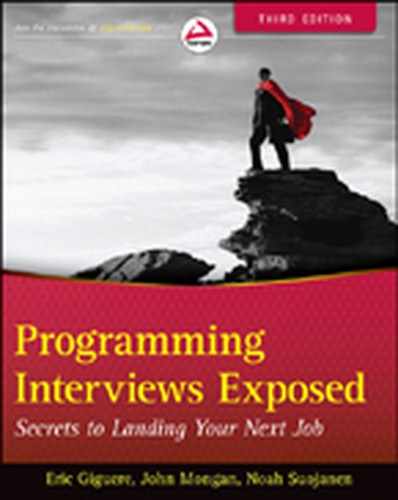Basic Linked List Operations
Successfully solving linked list problems requires a thorough understanding of how to operate on linked lists. This includes tracking the head element so that the list doesn’t get lost, traversing the list, and inserting and deleting list elements. These operations are much more straightforward with a doubly linked list, so we focus on the pitfalls of implementing these operations for singly linked lists.
Tracking the Head Element
The head element of a singly linked list must always be tracked; otherwise, the list will be lost — either garbage collected or leaked, depending on the language. This means that the pointer or reference to the head of the list must be updated when a new element is inserted ahead of the first element or when the existing first element is removed from the list.
Tracking the head element becomes a problem when you alter the list inside a function or method, because the caller must be made aware of the new head element. For example, the following Java code is incorrect because it fails to update the reference to the head of the list:
public void insertInFront( ListElement<Integer> list, int data ){
ListElement<Integer> l = new ListElement<Integer>( data );
l.setNext( list );
}The correct solution is to return the new head element from the method:
public ListElement<Integer> insertInFront( ListElement<Integer> list, int data ){
ListElement<Integer> l = new ListElement<Integer>( data );
l.setNext( list );
return l;
}The caller updates its reference to the head element accordingly:
int data = ....; // data to insert
ListElement<Integer> head = ....; // reference to head
head = insertInFront( head, data );In C or C++ it’s easier to make mistakes with pointer misuse. Consider this C code (that uses C++ features such as the bool datatype that are now available in C as part of the C99 standard) for inserting an element at the front of a list:
bool insertInFront( IntElement *head, int data ){
IntElement *newElem = malloc( sizeof(IntElement) );
if( !newElem ) return false;
newElem->data = data;
newElem->next = head;
head = newElem; // Incorrect! Updates only the local head pointer
return true;
}The preceding code is incorrect because it updates only the local copy of the head pointer. The correct version passes in a pointer to the head pointer:
bool insertInFront( IntElement **head, int data ){
IntElement *newElem = malloc( sizeof(IntElement) );
if(!newElem) return false;
newElem->data = data;
newElem->next = *head;
*head = newElem;
return true;
}This function uses the return value to indicate the success or failure of the memory allocation (because there are no exceptions in C), so it can’t return the new head pointer as the Java function did. In C++, the head pointer could also be passed in by reference, or the function could return the new head pointer.
Traversing a List
Often, you need to work with list elements other than the head element. Operations on any but the first element of a linked list require traversal of some elements of the list. When traversing, you must always check that you haven’t reached the end of the list. The following traversal is unsafe:
public ListElement<Integer> find( ListElement<Integer> head, int data ){
ListElement<Integer> elem = head;
while( elem.value() != data ){
elem = elem.next();
}
return elem;
}This method works fine as long as the data to find is actually in the list. If it isn’t, an error occurs (a null reference exception) when you travel past the last element. A simple change to the loop fixes the problem:
public ListElement<Integer> find( ListElement<Integer> head, int data ){
ListElement<Integer> elem = head;
while( elem != null && elem.value() != data ){
elem = elem.next();
}
return elem;
}With this implementation, the caller must detect an error condition by checking for a null return value. (Alternatively, it may make more sense to throw an exception if the end of the list is reached and the element cannot be found.)
Inserting and Deleting Elements
Because links in a singly linked list are maintained exclusively with next pointers or references, any insertion or deletion of elements in the middle of a list requires modification of the previous element’s next pointer or reference. If you’re given only the element to delete (or before which to insert), this requires traversal of the list from the head because there’s no other way to find the preceding element. Special care must be taken when the element to be deleted is the head of the list.
This C function deletes an element from a list:
bool deleteElement( IntElement **head, IntElement *deleteMe )
{
IntElement *elem;
if (!head || !*head || !deleteMe ) /* Check for null pointers */
return false;
elem = *head;
if( deleteMe == *head ){ /* special case for head */
*head = elem->next;
free(deleteMe);
return true;
}
while( elem ){
if( elem->next == deleteMe ){
/* elem is element preceding deleteMe */
elem->next = deleteMe->next;
free(deleteMe);
return true;
}
elem = elem->next;
}
/* deleteMe not found */
return false;
}Performing deletions raises another issue in languages without garbage collection, like C or C++. Suppose you want to remove all the elements from a linked list. The natural inclination is to use a single pointer to traverse the list, freeing elements as you go. A problem arises, however, when this is implemented. Do you advance the pointer first or free the element first? If you advance the pointer first, then the freeing is impossible because you overwrote the pointer to the element to be freed. If you free the element first, advancing the pointer is impossible because it involves reading the next pointer in the element that was just freed. The solution is to use two pointers, as in the following example:
void deleteList( IntElement **head )
{
IntElement *deleteMe = *head;
while( deleteMe ){
IntElement *next = deleteMe->next;
free(deleteMe);
deleteMe = next;
}
*head = NULL;
}